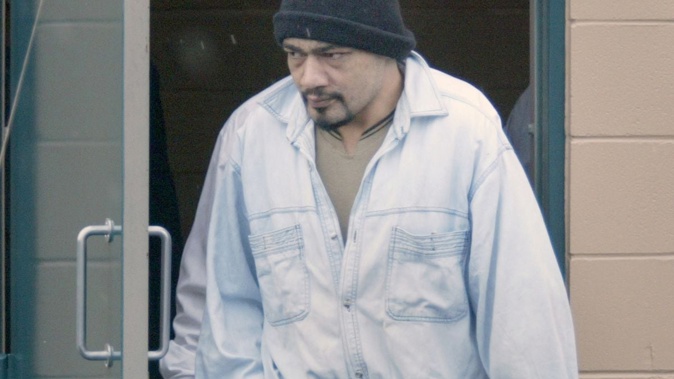
A one-armed hitchhiker killer was kicked out of an accommodation provider while on parole after accessing dating sites and contacting women, buying a phone without permission, and trying to recoup past debts.
Shane Hoko was sentenced to a minimum of 17 years in prison for strangling teenage hitchhiker Jennifer Hargreaves in South Auckland in December 2001. The sentence was later reduced to a minimum of 15 years on appeal.
He pointed a gun at a motorist and his two boys when he tried to help the young woman.
At the time of the killing, Hoko, a Black Power associate, was on parole for detaining a person in a house in Meremere.
Hoko claimed another man killed Hargreaves and left him to take the blame.
Hargreaves was hitchhiking to Invercargill for a reunion with her birth mother’s family when she was picked up by the pair. She was killed in a ditch in Cuff Rd, Patumāhoe.
The Herald earlier revealed that Hoko was facing charges in relation to allegedly being ejected from the accommodation provider he was released to on August 29 for not following the rules of the programme. Attending the provider was one of the special conditions of his parole.
Shane Hoko murdered teenage hitchhiker Jennifer Hargreaves in Auckland in December 2001. Photo / Kenny Rodger
On Wednesday, Hoko appeared before the Parole Board at a hearing attended by the Herald.
Hoko’s lawyer, Phillip Osborne, told the board at the outset that he was not seeking parole, but asked for another hearing in three to six months after further psychological intervention.
Since his recall he now fully understood his behaviour “fell well short of the mark”, Osborne said. He added that Hoko had a “really solid support network” and would be in a good position to seek release once he had done further work.
Panel convenor Sir Ron Young asked Hoko about his feelings regarding what happened at the accommodation provider.
“I did find it quite hard on several occasions. Especially around trying to understand what they were wanting from me and unable to get the feedback towards what they were asking me when I didn’t understand what was being asked in the first place which hence the reason why I started reaching out to my support people to get better understanding.”
He said he felt like he was being “held back” from progressing compared to other people.
Young said it appeared he was trying to say the problem was with the provider, rather than himself.
He said Hoko had unsolicited contact with a woman, deceived staff by buying a phone without permission, accessed dating sites and contacted women, was threatening towards staff, and arranged for past debts “from your own criminal activity” to be paid to him.
“That’s really bad Mr Hoko, that’s not good,” Young said.
“I didn’t really think about the possible high-risk consequence of trying to recoup past debts. When it was pointed out I stepped away from that altogether and haven’t pursued that avenue since and I have no plans of going on that pathway ever again around deception,” Hoko replied.
Young said he should have known what he was doing was wrong and “potentially dangerous”.
“I won’t give an excuse to justify it, I’ll own it,” Hoko told the board.
Young said Hoko’s inability to cope at the accommodation provider indicated he needed more oversight and supervision.
Panel member Professor Phil Brinded said looking at what happened it appeared Hoko had not been paying any attention to his safety plan, and lacked any “consequential thinking”.
“You murdered a 17-year-old hitchhiker, you took her life. Any contact with females is going to be looked at carefully, you’re on a life sentence. So unsolicited contact with an adult female, buying a phone, accessing the internet to go on dating websites to contact women - those are all risk issues that I thought you would’ve realised were things that you just should not do.”
Brinded said Hoko’s actions were “quite troubling”, and hoped he would be able to do some more work to help him get on top of what to do when he felt frustrated.
“It’s going to be up to you to show you can do that,” Brinded said.
Jennifer Hargreaves was hitchhiking to Invercargill for a reunion with her birth mother’s family.
Another panel member, Dr Greg Coyle, asked Hoko about the people he was trying to collect money from.
Hoko said some of them were members of different gangs, and some had no gang affiliations.
The board declined parole for Hoko and said they would see him again in January 2025.
During Hoko’s sentencing, Justice Rhys Harrison allowed Hoko to address the court, but Hargreaves’ adopted mother, Val, broke down weeping uncontrollably.
As Hoko turned around in the prisoners’ dock to face the back of the crowded court, he said: “My heart goes out to all of yous [sic]. All I can say is, I didn’t do it.”
Justice Harrison said aspects that set the offending apart were its sheer brutality and that it was most likely to be sexually motivated.
Hoko, the judge said, had a lengthy list of previous convictions for relatively minor offending, except for a “sinister charge” of kidnapping in 1999 for which he was sentenced to four years’ imprisonment, reduced to two years by the Court of Appeal.
Hoko was on parole at the time of the murder.
Outside the court, Hargreaves’ adopted father, John Hargreaves, said he found it hard to grasp how a person in jail for a kidnapping offence could be “let out to commit another such crime”.
Sam Sherwood is a Christchurch-based reporter who covers crime. He is a senior journalist who joined the Herald in 2022, and has worked as a journalist for 10 years.
Take your Radio, Podcasts and Music with you

/cloudfront-ap-southeast-2.images.arcpublishing.com/nzme/LJLKXMCULFBBTP4ZUUNMNITUPQ.JPG)
/cloudfront-ap-southeast-2.images.arcpublishing.com/nzme/AVVQRSW2BNB27J6CFINWZODO3E.JPG)








